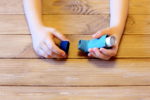 There may be a time when you have to treat a patient having an asthma attack who either does not have their inhaler with them or their inhaler is empty. In these cases where a replacement is not available, you would need to take other measures to control the attack before help arrives.
There may be a time when you have to treat a patient having an asthma attack who either does not have their inhaler with them or their inhaler is empty. In these cases where a replacement is not available, you would need to take other measures to control the attack before help arrives.
The first thing to do is, with any asthma attack, get them to stop what they were doing. Ask them to sit down in an upright position. If they bend over or lay down, more strain can actually be put on the lungs. Then see if you can locate any replacement medication. This may mean sending someone else away for it if this is possible. Find out if there are any other medications their doctor has prescribed for them to control their asthma. However, if the attack is getting worse, they may struggle to verbally answer questions. Ask them simple “Yes/No” questions or get them to answer with gestures.
Things you can do
- Get them to take long and deep breaths. This slows the breathing down and prevents them from hyperventilating, making the attack worse. Breathing in through the nose and out through the mouth also helps.
- Moving the person to a steamy atmosphere such as a bathroom with the shower can increase the humidity in the air and this may help.
- Keeping them calm is very important and although this may not be easy, do your best to calm the situation and take away any worry from them. Stress causes the chest muscles to tighten which can make breathing more difficult.
- If possible, remove the person from the trigger that causes their Asthma. It may be their trigger is dust or smoke so move them to a place where the air is clear. Taking them to an air-conditioned area may help them.
- Sometimes hot caffeinated drinks can help open up their airways giving them some relief for an hour or two.
This advice can help them in the short term but you must get professional help as soon as possible.
Inhaler Problems
It may be that the person has an inhaler but it is not working effectively. So there are a few things you can do to ensure that the inhaler is ready every time it is needed:
- Ensure that the inhaler is always clean and that the cover is always put back on to avoid dirt and dust getting inside. Inhaling dust or dirt will make the situation worse. You should also ensure that if a spacer is used, it is kept clean and dry. Also, change the mouthpiece when needed or every few months. Ensure the inhaler actually has the drug inside and you are not just breathing propellant.
- Make sure that a spare canister is carried when the level is low.
- Ensure the latest prescription is collected from the chemist.
- Make sure a spare inhaler is carried if going away on holiday or a work trip.
- If you work in a school that holds inhalers, ensure the correct documentation is kept and that there are sufficient inhalers for the number of children in your care.
- Make sure the correct inhaler is used at the right time. Using a preventative inhaler in an emergency will not have the same effect as the correct inhaler.
- Ensure the inhaler is used correctly. Sometimes children blow instead of breathing in and make sure that subsequent doses are delivered at the right times.
- Finally, ensure that the inhaler is in date as the medication may not be effective past its expiry date or the propellant may not deliver the correct amount of drug.
For more information on training courses, visit our “Courses” page which also includes our First Responder and First Person on Scene (FPOS) Courses.


Pingback: Asthma
Pingback: What are the emergency medical drugs held by dentists in the UK
Pingback: Asthma Spacers - First Aid Wiki
Pingback: Asthma a common life-threatening condition thats severity is often missed